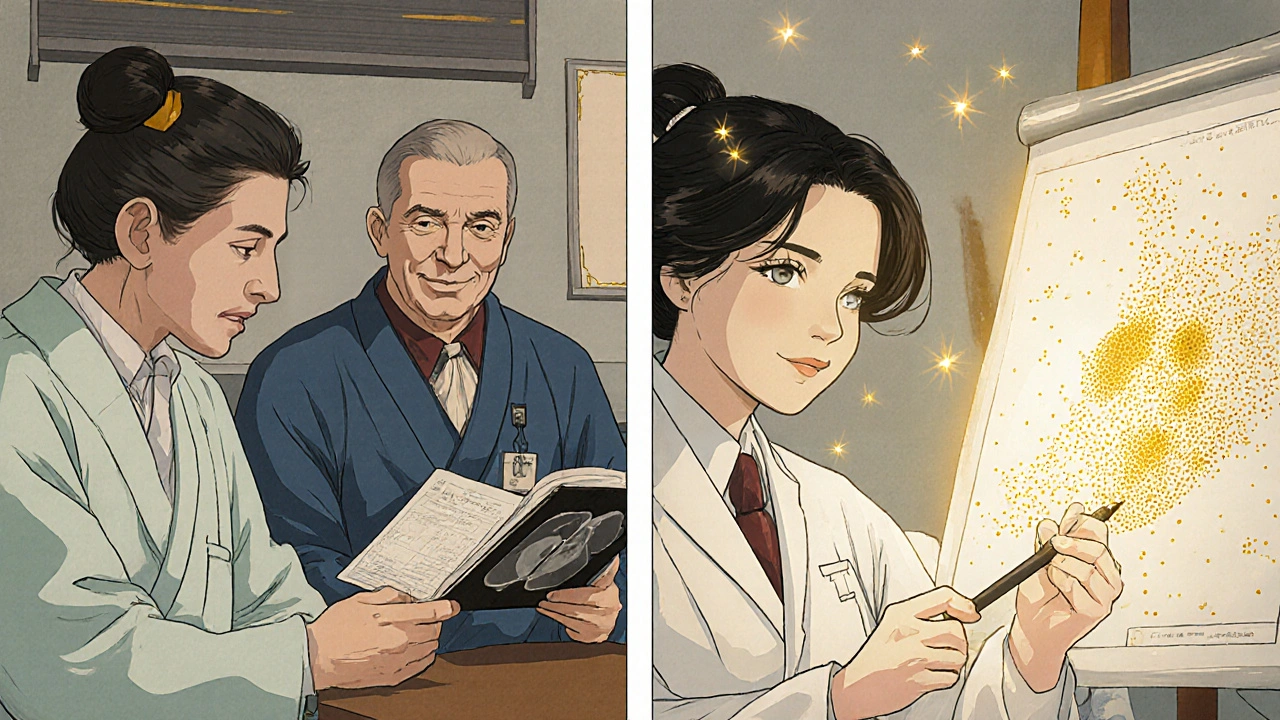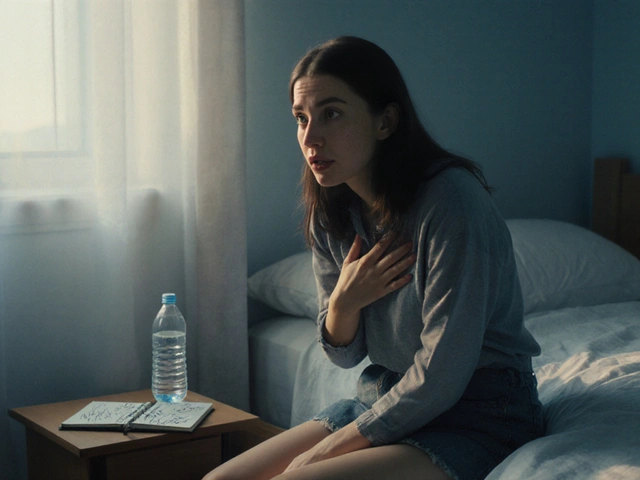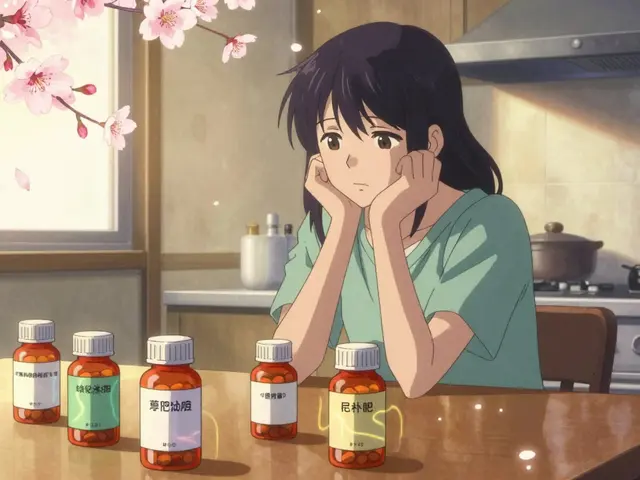For years, doctors told patients with a history of cancer who also had autoimmune diseases like rheumatoid arthritis or Crohn’s disease: wait at least five years before restarting immunosuppressants. The fear was simple - if your immune system is turned down, it might not catch cancer coming back. But that advice? It wasn’t backed by solid data. Now, after years of large studies tracking tens of thousands of patients, we know better.
Immunosuppressants Don’t Automatically Raise Cancer Recurrence Risk
A major 2016 meta-analysis in Gastroenterology looked at over 11,700 patients with autoimmune conditions who had survived cancer. It compared those who took no immunosuppressants, those on anti-TNF drugs like infliximab or adalimumab, those on older drugs like methotrexate or azathioprine, and those on combinations of all three. The results? No meaningful difference in cancer recurrence rates across any group. The recurrence rate for those not on any immunosuppressant was 37.5 cases per 1,000 person-years. For those on anti-TNF therapy? 33.8. For combination therapy? 54.5. None of these differences were statistically significant.
That’s not a fluke. A 2024 update, doubling the sample size to over 24,000 patients and adding more than 85,000 person-years of follow-up, confirmed it. Whether you started immunosuppressants six months after cancer treatment or six years later, your risk of recurrence didn’t change. The idea that you need to wait five years? It was never proven. It was just assumed.
What Types of Immunosuppressants Are Safe?
Not all immunosuppressants are the same - but when it comes to cancer recurrence, the data shows they’re similarly safe. Anti-TNF agents (infliximab, adalimumab, etanercept) are among the most studied. So are traditional drugs like methotrexate, azathioprine, and 6-mercaptopurine. Even newer biologics - ustekinumab, vedolizumab, and JAK inhibitors like tofacitinib - show no increased risk in these large studies.
Interestingly, newer biologics had slightly lower recurrence numbers than older drugs, but the difference wasn’t big enough to call it a protective effect. That’s important: it doesn’t mean they’re better at preventing cancer, just that they’re not worse. For patients who’ve had breast cancer, melanoma, or colon cancer, the results held steady across all types. No single cancer showed a consistent spike in recurrence tied to any specific drug.
Timing Doesn’t Matter - But Cancer Type Does
One of the biggest myths was that timing was everything. If you had cancer two years ago, wait. If it was seven years ago, you’re fine. The data says otherwise. Starting immunosuppressants within five years of cancer diagnosis didn’t increase recurrence risk. Starting after five years? Same result. The clock doesn’t reset your risk.
But cancer type? That still matters. Melanoma is the one exception doctors still watch closely. While the overall data doesn’t show increased recurrence, melanoma is highly sensitive to immune surveillance. A few small studies have raised flags, so many clinicians still prefer to delay biologics in patients with recent melanoma - especially stage III or IV. The same goes for certain blood cancers like leukemia or lymphoma. If your cancer is still active or was very aggressive, restarting immunosuppressants isn’t just risky - it’s often not an option yet.
For most other cancers - breast, lung, colon, prostate - the evidence is clear: your immune system’s suppression from medication doesn’t undo your cancer treatment. Your body’s ability to stay cancer-free after surgery, chemo, or radiation isn’t undone by a drug that controls your joints or gut.

Why Did Everyone Think It Was Dangerous?
The fear came from logic, not data. We know the immune system kills abnormal cells. We know immunosuppressants lower immune activity. So, logically, turning down immunity should let cancer return. It makes sense - until you look at the numbers.
Early studies were small, often retrospective, and mixed patients with very different cancer histories. Some were on immunosuppressants for years before cancer; others started them after. No one controlled for cancer stage, treatment type, or time since remission. The first big studies that did? They flipped the script.
What’s more, many patients who avoided immunosuppressants ended up with worse outcomes from their autoimmune disease. Uncontrolled rheumatoid arthritis increases heart disease risk. Active Crohn’s can lead to hospitalizations and surgeries. The cost of avoiding immunosuppressants wasn’t just about cancer - it was about quality of life, disability, and even early death from complications of the original disease.
What Do Experts Recommend Now?
The American College of Rheumatology, the European League Against Rheumatism, and major journals like NEJM Journal Watch all say the same thing: stop using arbitrary waiting periods. Treatment decisions should be personalized.
Here’s what a good conversation with your doctor should cover:
- What type of cancer did you have? Stage? How was it treated?
- How long has it been since your last treatment? Are you in full remission?
- How severe is your autoimmune disease? Are you in pain, losing function, or facing organ damage?
- What are your options? Can you start with a lower-risk drug first?
- What’s your monitoring plan? How often will you get scans or blood tests?
There’s no one-size-fits-all answer. But blanket bans? They’re outdated.
Monitoring After Starting Immunosuppressants
Just because the risk isn’t higher doesn’t mean you stop watching. If you’re restarting immunosuppressants after cancer, you need a clear monitoring plan. This isn’t optional - it’s standard care now.
Typical monitoring includes:
- Physical exams every 3-6 months
- Annual imaging (CT, MRI, or ultrasound) based on your cancer type - for example, mammograms for breast cancer survivors, colonoscopies for colorectal cancer
- Blood tests to check for tumor markers if relevant (like CEA for colon cancer)
- Skin checks every 6-12 months if you’ve had melanoma or have high sun exposure
- Keeping a symptom diary: new lumps, unexplained weight loss, persistent fatigue, or night sweats
Many patients are surprised to learn their oncologist and rheumatologist (or gastroenterologist) can work together on this. Team-based care is now the norm. Your care team should include both specialists - not just one.

Real-World Impact: More Patients Are Getting Treatment
Since the 2016 studies came out, prescription rates for biologics in patients with prior cancer have jumped 18.7%, according to IQVIA data. That’s not because more people are getting cancer - it’s because doctors feel confident prescribing.
The FDA and EMA updated drug labels in 2022 to reflect this. Now, the prescribing information for drugs like adalimumab and infliximab includes a line that says: “Clinical studies have not shown an increased risk of cancer recurrence in patients with prior malignancy treated with this agent.”
That’s huge. It means insurance companies can’t deny coverage based on outdated guidelines. It means patients aren’t being forced to choose between pain and cancer risk.
What’s Next? Ongoing Studies
Even with strong data, questions remain. Two major studies are still running:
- The RECOVER study (NCT04567821) is tracking IBD patients with prior cancer on different immunosuppressants. Results are expected in mid-2026.
- The RHEUM-CARE study (NCT04321987) is following 5,000 rheumatoid arthritis patients with cancer histories to find patterns by drug type and cancer stage.
These won’t change the big picture - the evidence is already solid - but they’ll help fine-tune recommendations for specific cases.
Bottom Line: You Can Be Safe and Well
If you’ve had cancer and now need immunosuppressants for an autoimmune disease, you don’t have to live in fear. The science says you can restart these medications without significantly increasing your cancer recurrence risk. The old rule - wait five years - was never evidence-based. It was fear dressed up as caution.
What matters now is your individual story: your cancer type, how long you’ve been in remission, how your autoimmune disease is affecting your life, and how you’ll be monitored. Work with both your oncologist and your specialist. Don’t let outdated guidelines stop you from living well.
You’ve already beaten cancer once. Now, you can take back control of your health - without giving up your future.







thilagavathi raj
30 Oct, 2025
Anti-TNF? Methotrexate? JAK inhibitors? The data’s clear - no statistically significant recurrence spike. We’ve been operating on dogma, not evidence. Time to update the guidelines already.
Helen Moravszky
30 Oct, 2025
OMG this is such a relief!! I’ve been terrified to restart my biologic after breast cancer… my rheum doc said ‘wait 5 years’ but I’ve been in pain for 2 years!! This makes me feel so much better 😭🙏
Reginald Matthews
31 Oct, 2025
Interesting that the recurrence rates were nearly identical across groups. The 54.5 for combination therapy seems higher, but not statistically significant. I wonder if that’s just noise or if there’s a subtle interaction we’re missing.
Debra Callaghan
2 Nov, 2025
So doctors have been scaring people for years with zero proof? That’s malpractice. If you’re not willing to update your practice based on real data, you shouldn’t be prescribing anything. Stop playing God with people’s lives.
Mitch Baumann
4 Nov, 2025
Indeed. The paradigm shift is profound… 🤯 The meta-analysis from Gastroenterology (2016)… then the 2024 replication with 85,000+ person-years… it’s not just robust - it’s *elegant*. The myth of the five-year wait? A relic of pre-evidence-based medicine. 📉
Gina Damiano
4 Nov, 2025
Wait, so if I had melanoma 3 years ago, I can still take adalimumab? My dermatologist said no way. Should I get a second opinion? Or is he just scared?
Emily Duke
4 Nov, 2025
People are still scared of biologics? After all this data?? You’re choosing pain over cancer risk? That’s not bravery, that’s ignorance. I’ve been on Humira for 8 years - I’m alive, I’m mobile, I’m not in the hospital. You’re letting fear run your life.
Stacey Whitaker
6 Nov, 2025
So… the real villain here wasn’t the drug. It was the fear. And the doctors who didn’t question it. We’ve been making patients suffer unnecessarily for a decade. I’m glad the data finally caught up.
Kayleigh Walton
8 Nov, 2025
If you’ve been holding off on treatment because of this myth - please talk to your care team. You don’t have to choose between managing your autoimmune disease and fearing cancer. The science is on your side. You’ve already fought cancer once - now let’s help you live fully again. You deserve this.
Sean Nhung
8 Nov, 2025
So JAK inhibitors are safe too? That’s huge. My cousin’s on Xeljanz and had colon cancer 4 years ago. I’ll send him this. 🙌
kat pur
9 Nov, 2025
This is exactly the kind of evidence that should change clinical practice. The fact that it took this long is frustrating, but the clarity now is a win. Thank you for sharing.
Vivek Mishra
10 Nov, 2025
What about skin cancer in transplant patients? Different ballgame. Don’t generalize.
Sandridge Neal
12 Nov, 2025
It is with profound gratitude that I acknowledge the rigorous epidemiological methodology underpinning this paradigm shift. The longitudinal design, the adjustment for confounders, and the statistical power of over 85,000 person-years represent a triumph of evidence-based medicine. This is not merely an update - it is a correction of a decades-long misalignment between clinical intuition and empirical reality. I commend the researchers, and urge all clinicians to revise their protocols forthwith.